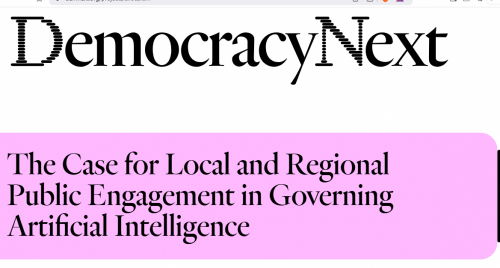
https://www.demnext.org/projects/ailocalism
To govern AI for public benefit, we must prioritise building public engagement capacity closer to the communities where AI systems are deployed.
New paper by Dr. Stefaan Verhulst, PhD (Co-Founder of The GovLab and The Data Tank) and Claudia Chwalisz (Founder and CEO of DemocracyNext)
As the Paris AI Action Summit approaches, the world’s attention will once again turn to the urgent questions surrounding how we govern artificial intelligence responsibly.
Discussions will inevitably include calls for global coordination and participation, exemplified by several proposals for a Global Citizens’ Assembly on AI.
While such initiatives aim to foster inclusivity, the reality is that meaningful deliberation and actionable outcomes often emerge most effectively at the local and regional levels.
Building on earlier reflections in “AI Globalism and AI Localism,” we argue that to govern AI for public benefit, we must prioritise building public engagement capacity closer to the communities where AI systems are deployed.
Localised engagement not only ensures relevance to specific cultural, social, and economic contexts but also equips communities with the agency to shape both policy and product development in ways that reflect their needs and values.
While a Global Citizens’ Assembly sounds like a great idea on the surface, there is no public authority with teeth or enforcement mechanisms at that level of governance.
The Paris Summit represents an opportunity to rethink existing AI governance frameworks, reorienting them toward an approach that is grounded in lived, local realities and mutually respectful processes of co-creation.
Toward that end, we propose:
- Local and Regional AI Assemblies: Forums where citizens, local governments, and technical experts collaborate to address context-specific challenges and opportunities in AI deployment. This may be to shape the policies of local, national or regional government, as was attempted in Belgium, or of another institution like a university. For example, what rules should govern the use of AI in healthcare? What should be the policies about the use of generative AI by students and teachers?
- AI Citizens’ Assemblies for EU policy: Some of the most important new AI legislation is coming out of the European Union. This is going to face considerable headwinds in the coming years, requiring that citizen deliberation is central to the European Commission’s work on AI. This might entail either a series of national citizens’ assemblies harnessing a common question, or EU-wide citizens’ assemblies on new issues related to the governance of emerging technologies at EU-level.
- Capacity-Building Programs: Initiatives to train local stakeholders in AI literacy, ethical considerations, and governance mechanisms.
- Localised Data Governance Models: Frameworks that respect local cultural norms and legal systems while ensuring interoperability with global standards. For example, we are inspired by the Serpentine’s recent experiment in bottom-up collective governance of a Choral AI Dataset.









